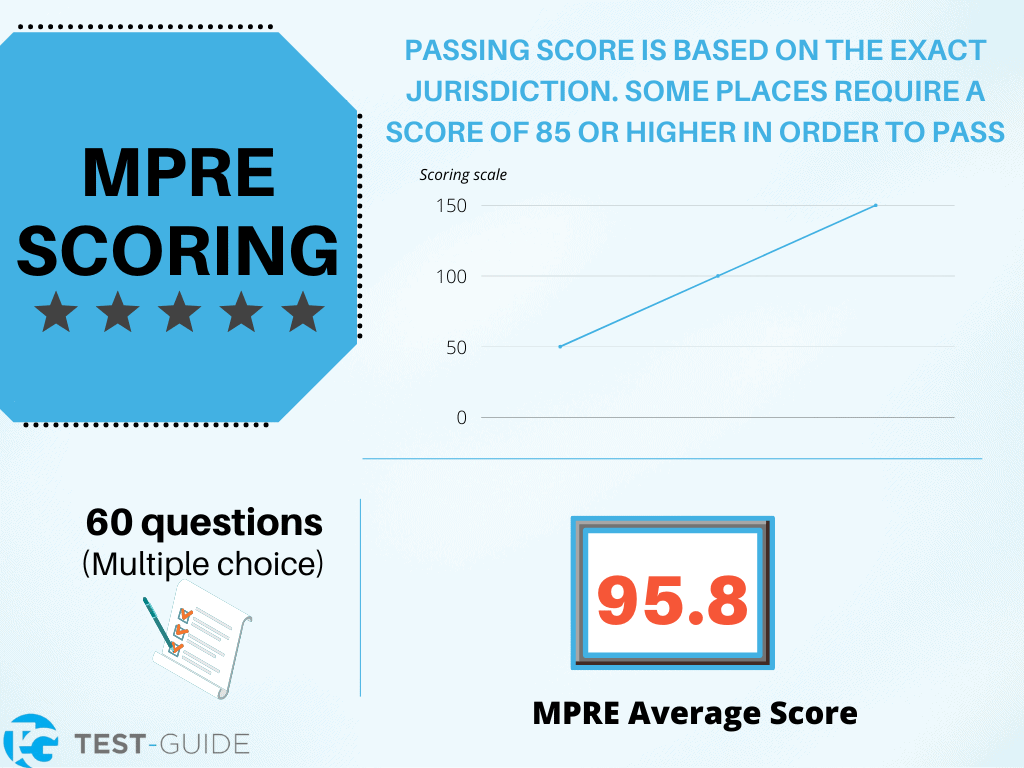MPRE practice questions will help students prepare for this grueling exam. First and foremost, MPRE is an acronym for Multistate Professional Responsibility Exam. It’s designed to ensure that law students understand the ethical laws that must be followed by lawyers, or Model Rules as they are known in the legal world.
Model Rules are the ultimate focus of the MPRE and are usually federally observed, so most states will require law practitioners to pass this exam. Students can also expect to be tested in case law, court rules, and legal opinions.
Summary: Prepare for the MPRE portion of the BAR exam with MPRE practice questions.
MPRE Practice Questions and Resources
| Resource | Notes | Provider |
| MPRE Sample Questions | Practice with 15 sample questions from the National Conference of Bar Examiners. | NCBE |
| MPRE Practice Questions | Prepare for the MPRE exam with these 500+ questions and answers. | Prof. Drury Stevenson |
| MPRE Flashcards | Review 85+ terms to prepare for the MPRE exam. | Quizlet |
| MPRE Flashcards | Review 100+ terms for the MPRE exam. | Quizlet |
MPRE Test Preparation
MPRE practice questions are a great way to prepare for this portion of the BAR exam, but there are some additional methods and tips you should keep in mind.
- Consider using a BAR prep course. These courses will help you prepare for the whole BAR exam, including the MPRE section.
- If you happen to score lower than expected the first time, don’t panic. It doesn’t mean that you didn’t study hard enough. Learn from your mistakes and change up your studies for the retake.
- The materials of a professional responsibility class are not always identical to the MPRE. While this class helps in a student’s preparation for the test, it’s not designed to supplement all studies.
- When reading questions, pay close attention to the keywords used so that you completely understand what’s being asked. A lot of incorrect answers come from misreading the question.
- Students will not master the MPRE with study alone, but through practical application. While you definitely need to memorize the rules, their application is what will be tested. This can be done by finding MPRE practice questions and using BAR prep courses.
- The MPRE has a lot of nuances so students must pay close attention to detail when reading and answering questions. Verbalism will play a huge factor.
MPRE Test Breakdown
Students will take the MPRE on computers at the testing facility. It has 60 multiple-choice questions but only 50 of them are actually scored. The other 10 are referred to as pretest questions and students will not know which ones they are.
All questions on the MPRE are distributed into 12 categories and are based on law governing the ethical conduct of lawyers and judges. With that said, students will also encounter questions outside of this context. These are designed to test comprehension of the accepted rules, principles, and regulations under law.
The distribution of questions looks like this:
| Subject | Percentage of Test |
| Legal Profession Regulation | 6% – 12% |
| Client/Lawyer Relationship | 10% – 16% |
| Client Confidentiality | 6% – 12% |
| Conflict of Interest | 12% – 18% |
| Malpractice, competence, and Civil Liability | 6% – 12% |
| Litigation and Advocacy | 10% – 16% |
| Transactions and Communications with Non-Clients | 2% – 8% |
| Different Roles of Lawyers | 4% – 10% |
| Safekeeping of Funds and Other Properties | 2% – 8% |
| Communications Concerning Legal Services | 4% – 10% |
| Lawyers’ Duties to the Public and Legal System | 2% – 4% |
| Judicial Conduct | 2% – 8% |
MPRE Test Administration
Students who want to take the MPRE must register through the National Conference of Bar Examiners. Once this part of the registration has been completed, students have to schedule the test itself.
It’s worth noting that there are no registrations allowed after the cutoff. No exceptions will be made. So register early and make sure that your registration is verified before the deadline.
The sooner you register, the more locations and test times you’ll have to choose from. However, these slots will be taken by other students over time so waiting longer limits your options.
Another requirement is that you have a National Conference of Bar Examiners account in order to register for the MPRE.
Always arrive at the testing facility at least 30 minutes before the test so that you can get the prescreening out of the way. You’ll be required to provide two forms of identification and go through other screening procedures.
The test itself is two hours in length.
When Will the MPRE Be Administered?
The MPRE is generally administered three times every year. That gives students ample time to plan ahead for it. The key is to find a time that works best for your personal schedule.
The MPRE is also administered on some weekdays in order to accommodate certain schedules.
The MPRE is a test that’s better to take as early as possible since many areas lock the BAR exam behind it. So make sure you take it early enough to give adequate time to take the BAR exam.
You should also plan for the unfortunate event that if you don’t pass the MPRE, you’ll have time to take it again before the BAR exam.
MPRE Scoring
The MPRE totals 60 questions that are all multiple-choice but only 50 of those questions are actually scored.
With that said, the scoring scale is between 50 to 150 and the passing score is based on the exact jurisdiction. Some places require a score of 85 or higher in order to pass! Here’s a list of the states and their jurisdictional requirements.
For instance, answering 30 questions correctly will result in a score of 85. In March 2020, the average scaled score for the MPRE was 95.8.
Results of the MPRE can take up to a month to receive.
Final Thoughts
The MPRE is designed to cover legal ethics in order to ensure that law students are prepared for the complexity of life as an attorney. As a result, the exam itself is quite tricky. It’s way more difficult than most people think so don’t let it catch you off-guard!
Lawyers will face legal decisions that are not always clear cut. This exam will test a law student’s ability to make ethical decisions that are not always clear cut.
Finally, keep in mind that the lessons learned in the professional responsibility class will not always apply since it doesn’t cover all of the questions asked on the MPRE. That’s why finding MPRE practice questions is so important.
MPRE FAQs
When is the best time to take the MPRE?
There really isn’t a “best time” to take the MPRE since it’s the same difficulty at all times. This isn’t a test where there might be an easier version of it in comparison to others.
So to answer this question, you should take the MPRE when you have the time to properly prepare for it. Try to plan it for a time when there’s not other stress vying for attention.
What forms of ID are considered valid?
Students will have to show two forms of valid identification to be allowed into the testing facility. The first and last name used for registration must exactly match that on the identification being shown.
The primary ID allowed is a student’s government issued identification and it must have your first name, last name, photo, and signature. A driver’s license meets this requirement.
The secondary ID must have the student’s first name, last name, signature, and a photo.
It’s also worth noting that if your government identification has an embedded or missing signature, you’ll be allowed to take the test as long as you meet all other requirements.
What keywords should I pay attention to on the MPRE?
This is an important point because a lot of the questions missed on the MPRE are due to a misunderstanding of two important keywords.
“Subject to discipline” and “subject to civil liability” are two entirely different phrases and are sometimes used interchangeably.
Subject to Discipline
This is asking whether or not the legal body violated a rule under the ABA Model Rules. Students should not follow their lessons in professional responsibility class when answering questions with this keyword phrase.
The reason is that a lot of law schools will list state-specific rules but these are not always the rules applied to the MPRE test. Only ABA Model Rules are tested on the MPRE.
Subject to Civil Liability
This keyword phrase is asking questions related to malpractice or any other forms of misrepresentation. Negligence is more of a concern here so keep that in mind when answering these questions.
For example, if a lawyer were to swear at a judge in the courtroom but it didn’t actually affect the client, then they would not be subject to civil liability. They would be subject to discipline because they broke a rule, but they never actually harmed a client.


